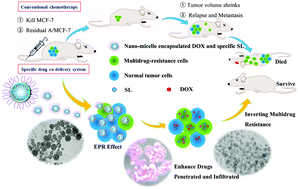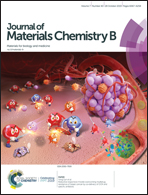Reductive responsive micelle overcoming multidrug resistance of breast cancer by co-delivery of DOX and specific antibiotic†
Abstract
The residual tumor cells after chemotherapy, even in very small numbers, are generally drug-resistant and invasive, which might result in the progress of tumor metastasis and recurrence. In this research, a new combination chemotherapy strategy of salinomycin (SL) that could selectively inhibit multidrug-resistant tumor cells and a traditional broad-spectrum antitumor drug, doxorubicin (DOX), based on redox-degradable nano-micelles was developed to overcome drug resistance in vitro. The results in vitro indicated that DOX + SL co-loaded nano-micelles could not only escape from the drug efflux of adriamycin-resistant MCF-7 cells (A/MCF-7) but also penetrated and infiltrated into 3D-cultured MCF-7 and 4T1 tumor spheres in vitro more effectively, resulting in a strong antiproliferative effect. In the allogeneic metastatic 4T1 tumor model, the combination chemotherapy of DOX + SL encapsulated in nano-micelles effectively suppressed tumor growth with no splenomegaly and no other major tissue damage, and reversed the EMT progress, and inhibited tumor recurrence and metastasis more effectively after drug withdrawal.



 Please wait while we load your content...
Please wait while we load your content...